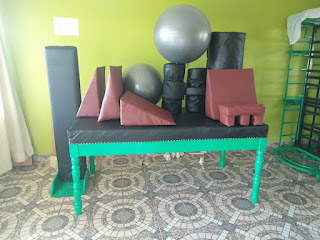It was in September 2019 that I came for the first time to Africa, to Kenya, and to Shianda. A lot of excitement, some expectations, and some fears. We are now in February 2021, time flies and I still have difficulties realizing that I have been more than one year in the field (between coming and going).
The first months in Shianda were full of exploration, getting to know the people, the system, the organizations, the services. At first, I felt I was not doing much, or that my focus was spreading in so many different directions that my impact would not be much.
Now I understand that these months were essential to allow me to work better after. All the different meetings allowed me to understand better where to focus my energy and to know better the local context regarding the support of children with disabilities.
With that knowledge, we were able to implement a better assessment and referral system in WEFOCO for the school program children with special needs.
Being all this time in the field allowed me also to see this system being implemented and children getting appropriate support in their education. Sometimes small changes make big differences.
Now after one year, despite feeling that there is still a lot of possibilities for further work in Shianda regarding the support of children with disabilities, I feel happy with what we achieved.
All the training, all the meetings, all the knowledge shared and learned, were worthy.

(Chairladys meeting - follow up on school program children)
(transporting the supplies for the children in the school program)
With 6 months of deployments, it might be challenging to see effective changes happening in the community. When I came at first I felt immediately that 6 months were not enough, and well was lucky enough to have the possibility to stay longer.
I remember finding a Special School that was struggling for the past years with administration and management issues and lack of motivation of teachers, I lived that with them last year. But I've also lived with them this year the power of a few motivated teachers, that accomplished the dream of implementing a Special Needs Class in the school. To be that person that the headteacher shared this amazing news in first hand, it feels somehow that I was already part of the school.
After one year this was an amazing result, not of my deployment but of a mutual joint effort of the education office, the current school staff and Wefoco. With the support from the microfinance of EUAV we were able to appreciate and boost this class even more with some essential supplies to stimulate these children.
(Special Needs Class in Rise and Shine)
(Rise and Shine children)
(Checking on the finishing of a walking bar to be donated to the Special needs class)
(Training of teachers, parents and caretaker from Rise and Shine School)
But Rise and Shine special School was not the only place where the positive growth was visible. Last month my mentor Martin a local Senior OT message me "Andreia congratulations on your work in Precious Home, they saw the added value of having a therapist in the home and just hired an OT" I was ecstatic with this great news, my training is still going on in Precious Home, and the caretakers and parents still motivated to learn. But having an OT in the home will allow the sustainability of the actions and give a better quality of life to all the children living in.
(Training of caretakers and parents in Precious Home)
(Workshop on positioning aids in Precious Home)
(Workshop on positioning aids in Precious Home)
(Caretakers playing with the children in Precious Home with donated supplies)
(Results of the positioning workshop)
(With Tina - Precious Home director)
Yesterday while walking in Shianda, one teacher approached me..."Madam...you remember me? from....School" and I was not remembering her well until she sings "Hapana Jiggers... Hapana Cucus"... our song to teach children how to prevent Jiggers! We did a campaign in her school in 2019 and she was still remembering the song after all this time. It made me smile! also to know the jigger situation in school is controlled.
(Teaching the Hapana Jiggers song/dance to the children)
All these and so many other little stories made me realize that sometimes we might doubt the impact of our actions, but in reality, the is an impact even if not visible immediately or so externally, it is there.
In the end, we are beings that are an accumulation of experiences, so what I am today is what my experiences, learning process, life, allowed me to be today. The same applies to the communities where we work, that training, that day, that conversation in the street, those sharing about my country or culture, all are part now of other lives and beings. I can only appreciate EUAV and Mondo for the opportunity to be the being I am today, shaped by all these experiences.
Asante Sana!

















